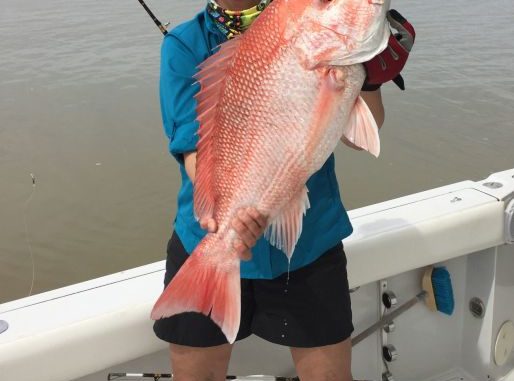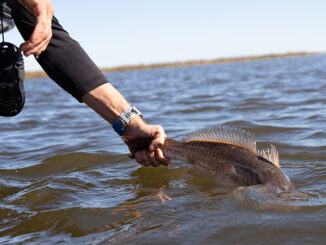
Starting in 2018, 150 randomly selected anglers will divide 25,000 pounds of snapper with no set season dates or daily bag limits
A two-year pilot program unveiled Thursday afternoon that the Louisiana Department of Wildlife and Fisheries contends could ultimately lead to state management of red snapper met with sharp criticism from conservation groups representing recreational anglers.
LDWF’s Exempted Fishing Permit Application (EFP) for State Management Pilot Project — which has already been delivered to the National Oceanic and Atmospheric Administration — would select 150 anglers by random drawing starting in 2018 who would be able to catch a total of 25,000 pounds of red snapper per year, according to a press release.
The EFP program would have no daily bag limit, and the total limit per EFP participant would be determined by the number of fish allocated to each participant, who would record the fish they catch and throw back on their smart phone. Anglers wouldn’t be limited to a particular season or to state waters, and could choose they days they head offshore.
“I asked Wildlife and Fisheries to develop a program that could eventually lead to Louisiana controlling red snapper fishing, even in what is determined to be federal waters,” Gov. John Bel Edwards said via the release. “This pilot program could not come soon enough as the federal government has limited anglers to just three days to fish red snapper this year.”
In the release, LDWF secretary Jack Montoucet said the program would allow the selected anglers the flexibility to fish at their convenience.
“Instead of using a season, we are going to try giving fishermen a set number of red snapper that they can catch in federal waters and ask them to record that data on their smart phone,” he said.
The timing of Thursday afternoon’s announcement from the department was puzzling to both Chris Macaluso, marine fisheries director for the Theodore Roosevelt Conservation Partnership, and David Cresson, executive director of the Coastal Conservation Association of Louisiana.
Both men said they were in a lengthy meeting at LDWF headquarters just Wednesday to talk about ways to fix red snapper management and to discuss ideas that would be presented to the Gulf Council — but the department’s plan outlined in Thursday’s press release wasn’t ever mentioned.
“This proposal never came up one time during that more than two-hour discussion,” Macaluso said. “This was done completely behind our backs with no consultation by recreational fishermen. This is clearly a move designed to privatize a public resource, and we are completely opposed to it ….
“The recreational fishing community has no choice but to be against this, and we’ve been very clear with the department that we’re against this …. Imagine doing this for speckled trout. Imagine suggesting this for redfish — we’re going to create a system where people own the redfish and they can go when other people can’t go. Would anybody accept that?”
Cresson agreed that the timing of the release right after Wednesday’s gathering was odd.
“The program that they’ve outlined here is IFQs (individual fishing quotas) for recreational anglers. It’s straight from the EDF (Environmental Defense Fund) playbook because they’ve pushed this in the commercial and charter sectors,” Cresson said. “Recreational anglers have resoundingly rejected this idea, so we’re surprised and disappointed this is moving forward.
“As of the meeting yesterday, we were working on details of the state management plan that would be brought before the Gulf Council with everybody’s input. This was never discussed. It’s just hard to come to grips with how people came from all over the state yesterday to meet in Baton Rouge to discuss real solutions to our snapper management problems, and this plan was never mentioned. This has caught us all by surprise today.”
Patrick Banks, LDWF’s assistant secretary for fisheries who attended Wednesday’s meeting, did not return a message left after business hours on Thursday.
Macaluso also likened the current LDWF proposal to an IFQ program for recreational anglers.
“We’re not trying to fix fisheries management for 150 people. We’re trying to fix it for everyone who wants to fish. Programs like this — and the organizations that are pushing programs like this — are pushing them because they want to prevent everyone from having the opportunity to fish,” Macaluso said. “This is an individual fishing quota program — the same as we see in the commercial sector, the same as we see them trying to set up in the charter boat sector, and in every case these programs are designed to limit access to a public resource ….
“The problem with that is the department doesn’t have enough fish to give to everybody who wants to fish. If you divide this into the 19- to 20,000 offshore landing permit holders, you come out with about two fish per person.”
Macaluso said he was somewhat hopeful after Wednesday’s meeting that a program utilizing LA Creel data to determine season length would have been implemented. That plan would have done away with the state and federal seasons, and allowed everyone access out to 200 miles, with possession and size limits remaining the same as they are currently.
“We were very hopeful that proposal would be considered favorably because it seemed like it was a good faith effort on the part of the Department to fix snapper management and other reef fish management,” he said. “What it would do would open up more of Louisiana for people to be able to fish. Right now, most of the fishing effort is isolated to the eastern one-third of the state during the state season because there’s not enough deep water within 9 miles at a lot of places in western and central Louisiana.”
Apparently, the EFP proposal doesn’t require the approval of the entire Gulf Council, even though it will be discussed at June’s meeting.
“Red snapper are a public resource and we should reject any program that privatizes that resource, or picks winners and losers,” Cresson said. “No matter what the motivation behind this EFP, it is a step in the direction of IFQs for recreational anglers.
“This could have been handled much differently.”


